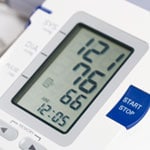Eating Right for Men
Move More
 Regular physical activity helps improve your overall health and fitness, and reduces your risk for many chronic diseases.
Regular physical activity helps improve your overall health and fitness, and reduces your risk for many chronic diseases.
Recommendation:
To get started, increase your physical activity level to 30 minutes per day, most days of the week. Ten minutes at a time is fine, and you can spread out your activity during the week, so you don’t have to do it all at once. It's about what works best for you, as long as you're doing physical activity at a moderate or vigorous level for at least 10 minutes at a time.
Always check with your doctor before beginning any exercise program, especially if you're a man over 45, or if you have cardiovascular risk factors such as smoking, high blood pressure, high cholesterol, diabetes, or a family history of heart disease.
Regular Checkups
 Regular health exams and tests can help find problems before they start. They can also help find problems early, when your chances for treatment are better. Regular screenings may include blood pressure, cholesterol, glucose, prostate health, and more. Talk with your doctor or healthcare provider to see what screenings are recommended for you.
Regular health exams and tests can help find problems before they start. They can also help find problems early, when your chances for treatment are better. Regular screenings may include blood pressure, cholesterol, glucose, prostate health, and more. Talk with your doctor or healthcare provider to see what screenings are recommended for you.

 You are about to leave publix.com and enter the Instacart site that they operate and control. Publix’s delivery and curbside pickup item prices are higher than item prices in physical store locations. Prices are based on data collected in store and are subject to delays and errors. Fees, tips & taxes may apply. Subject to terms & availability. Publix Liquors orders cannot be combined with grocery delivery. Drink Responsibly. Be 21. For prescription delivery, log in to your pharmacy account by using the Publix Pharmacy app or visiting
You are about to leave publix.com and enter the Instacart site that they operate and control. Publix’s delivery and curbside pickup item prices are higher than item prices in physical store locations. Prices are based on data collected in store and are subject to delays and errors. Fees, tips & taxes may apply. Subject to terms & availability. Publix Liquors orders cannot be combined with grocery delivery. Drink Responsibly. Be 21. For prescription delivery, log in to your pharmacy account by using the Publix Pharmacy app or visiting